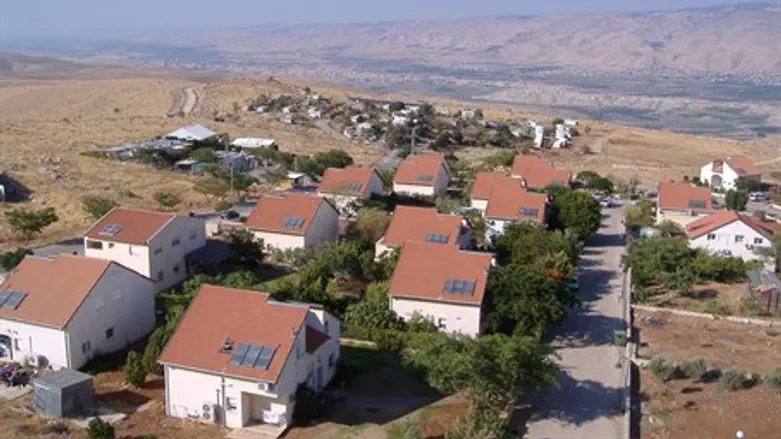
Defense Minister Moshe Ya'alon (Likud) has signed his approval for the urban building plan of Hemdat, a town in the Jordan Valley that has had its construction frozen for the past 19 years.
Shalom Kuperman, a member of the Hemdat secretariat and one of the most long-standing residents of the town, spoke to Arutz Sheva on Wednesday about the welcome news.
Kuperman noted that around 40 families live in the town, and said that with the approval "we are approaching building processes for a new neighborhood."
Without an approval on the urban building plan, all construction in the town had automatically been classified as illegal, blocking the natural development of the town - a situation replicated in Jewish towns and villages throughout Judea and Samaria.
"This approval opens for us all the possibilities for developing Hemdat and the (Jordan) Valley," he said.
Kuperman described how established families have been waiting to build their homes in Hemdat, and likewise new families hoping to join the community have been delayed as they couldn't have houses built for them. Aside from personal houses, the long wait for approval has caused the town's synagogue, kindergarten and day care center to be housed in caravans.
In addition, roads and infrastructure have not been developed or maintained for nearly 20 years - but now that all is set to change.
"As a town of law-abiding citizens who want to develop the (Jordan) Valley and the entire country, this delayed us. We couldn't draw up contracts for the purchase and sale of houses. It delayed all development of life here," said Kuperman.
Sovereignty - for good or bad?
When asked what prevented the granting of the permission until now, Kuperman said no valid reason existed for the delay.
"There was no problem. We are on state land. Also in terms of plans there was no problem, and the urban building plan could have been passed ten years ago," he said. "Currently it was necessary to make several changes because the law is advancing and we needed to fix several new amendments."
Kuperman noted that in Judea, Samaria and the Jordan Valley, urban building plans have to pass through several steps in order to reach the Defense Minister's approval, and afterwards there are another seven to ten steps that need to occur.
As for the possibility that the approval may signal a move towards an implementation of Israeli sovereignty on the Jordan Valley, he said, "we believe with full faith that all parts of the land of Israel belong to us, whether they were territories that we liberated in 1948 or in 1967 or parts we will liberate in the future, all of it needs to be under the sovereignty of the nation of Israel."
"The problem is that if we want to implement the law in a way that only the obligations and the regulations and the irritating things are implemented, but the other things, the 'candies,' are not implemented for us, that's kind of problematic," he added.
"The (Jordan) Valley is mostly made of farmers, and if the outcome of sovereignty is harm to the farmers then we have a problem."
At the same time, Kuperman said, "I think that the Defense Minister and the Prime Minister are people who love the (Jordan) Valley and the nation and want what is good for it, and work so that the Jordan Valley will be under the full sovereignty of the state of Israel."
"I know that they have difficulties and I trust that they will do their job in the best way possible for the nation of Israel."